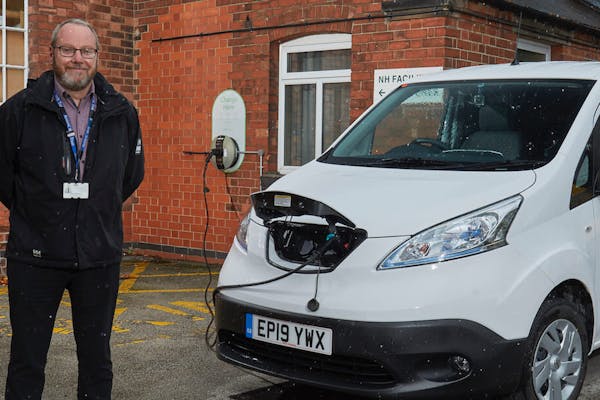Unique 30-day EV load scheme in Nottingham
Unique 30-day ‘try before you buy’ electric vehicle loan scheme in Nottingham provides blueprint for UK cities
A unique 30-day ‘try before you buy’ electric vehicle loan scheme piloted by the Nottingham ULEV Experience project and financed through Nottingham City Council’s Go Ultra Low funding has the potential to act as a blueprint for other UK cities that are considering Clean Air Zones.
The Ultra-Low Emission Vehicle loans have been delivered by DriveElectric, one of the UK’s leading EV leasing companies, for the Nottingham ULEV Experience project for the last two years, offering businesses and public sector organisations the opportunity of a fully-funded trial of electric cars and vans for 30 days.
Research carried out in March 2020 has shown that the Nottingham ULEV Experience project has been the only solution for businesses to try out an EV for this period of time. A total of 16 vehicle dealerships were contacted to arrange an EV trial and not one could offer a similar 30-day loan.
DriveElectric has managed the EV trials for the Nottingham ULEV Experience including providing the vehicles, booking the 30-day loans, providing a handover about the vehicles and charging, being available throughout the trial to answer any queries, and even arranging insurance if required.
The vehicle fleet included some of the very latest EVs such as the Hyundai Kona Electric and Kia e-Niro, which are long-range EVs, capable of between 250-300 miles per charge, and these vehicles proved to be the cars that were most in demand. A total of 52 organisations in Nottingham have enjoyed 72 EV loans over the last 18 months, with 20 EVs being adopted as a result so far.

As well as businesses, public sector organisations can be successful ULEV early adopters for a range of reasons, including due to the driving cycles of their fleets often being ideally suited to electric vehicles. Nottinghamshire Healthcare NHS Foundation Trust is one example of such an organisation, which trialled EV loans from the ULEV Experience. The project provided Renault Kangoo and Nissan e-NV200 electric vans for a month to allow the Transport and Logistics team to assess the suitability of the vehicles.
Following the trial, positive feedback was received about the larger Nissan e-NV200 van in particular. As well as the electric vans having zero emissions, lower whole-life costs, and being suitable for the required duties, employees preferred the driving experience of the EVs. The Trust now operates two Nissan e-NV200s and based on running these vehicles to date, 40 vans could be swapped to EVs.
“Most organisations need to experience electric vehicles before making a decision to purchase. Fully-funded month-long EV loans are not readily available through dealerships, manufacturers or any other source. Therefore the ‘Try before you buy’ EV loans provided by the ULEV Experience have been extremely valuable in filling a gap in the market not offered elsewhere.”
The ULEV Experience has been a programme dedicated to supporting Nottingham businesses to understand, trial and implement Ultra-Low Emission Vehicles, and has been funded by Nottingham City Council’s Go Ultra Low City project. The programme has been delivered by a consortium led by Cenex, with partners from DriveElectric, Energy Saving Trust, RideWise, CleanTech Business and Automotive Comms.
Similar EV loan schemes could be adopted by other cities around the UK that are implementing measures such as Clean Air Zones to improve air quality. Interest in electric vehicles has risen further since the government announced that the proposed ban on sales of new petrol and diesel vehicles – including plug-in hybrids – may be brought forward from 2040 to 2035 – or possibly even as soon as 2032.
Businesses looking to adopt EVs have been incentivised by measures in the March 2020 Budget. Chancellor of the Exchequer Rishi Sunak confirmed that motorists buying electric cars would continue to benefit from the Plug-In Car Grant (until 2022-2023), although it would reduce from £3,500 to £3,000, and cars costing £50,000 or more would be excluded.
The Plug-In Van Grant also continues, providing up to a maximum of £8,000 off the price of a plug-in van, and there’s up to £20,000 off the price of large vans and trucks.
Company car benefit-in-kind (BIK) tax rates already announced for the three years 2020-2021, 2021-2022 and 2022-2023 were confirmed in the Budget. However the Chancellor also said that rates would then be frozen for the following two financial years, 2023-2024 and 2024-2025. This means that a pure EV will have 0% BIK in 2020-2021, 1% BIK in 2021-2022, and 2% BIK in 2022-2023 – and in 2023-2024 and 2024-2025.
There was more good news for EV buyers in relation to Vehicle Excise Duty (VED). From 1 April 2020 until 31 March 2025 all zero emission vehicles will be exempt from the VED ‘expensive car supplement’. Currently all cars with a list price above £40,000 pay a £320 supplement, which increases to £325 from 1 April 2020, for five years from the second time a vehicle is taxed.